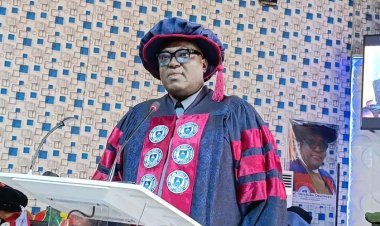Your Certificate no longer Guarantees Employment, Jamb Tells Graduates
Registrar of the Joint Admissions and Matriculation Board (JAMB), Professor Is-haq Olanrewaju Oloyede, has warned that university degrees may no longer be the sole guarantors of jobs, assuring that only demonstrable skills will.

The Registrar of the Joint Admissions and Matriculation Board (JAMB), Professor Is-haq Olanrewaju Oloyede, has warned that university degrees may no longer be the sole guarantors of jobs now that the world has attained the Information Age, assuring that only demonstrable skills will. He said this at the Kwara State University (KWASU) 2023 convocation lecture.
Oloyede while delivering the lecture titled: “Learning, Unlearning, and Relearning- Prerequisites of the Digital Age, urged Nigerians to get poised for the challenges of the Information Age by taking lifelong learning seriously and being willing to change as circumstances unfold.
See Also: JAMB Announces New Testing Measures for Direct Entry Candidates
Oloyede defined relearning as the ability to acquire new skills, knowledge, and perspectives quickly and effectively, also noting that learning is useless without practice
“For all, the imperative of learning, relearning and unlearning cannot be over-emphasized as the tonic that gives vitality to successful living in today’s Information Age. Those who can learn, unlearn and relearn are the successful ones, and those without the mindset that accommodates the triad are bound to perpetually lament,” Oloyede said.
“The world of today is totally different from the world inhabited by our forebears. One of the factors responsible for this change is the totality of what makes the Information Age, which is still evolving as technology develops rapidly.
“The changes of the world provide new opportunities and threats. While there are new opportunities in Information Technology, the existing jobs as typists, receptionists, traditional printers, telephone booth operators, computer operators, factory workers, cashiers, travel agents, fuel attendants, among others, are on the verge of extinction.
Related: JAMB Announces Verbal Reasoning Tests for 2024 DE Candidates, Gives Reason
“New opportunities will emerge in the high-tech sector and many skills that were not otherwise thought in traditional schools would be needed. Degrees would no longer be sole guarantors of jobs, but demonstrable skills will.
“In this regard, there won’t be any difference between those who are literate and those who are illiterate without the cutting-edge skills that are associated with learning, relearning and unlearning.
“Therefore, the onus of the responsiblity lies on everyone to get prepared for the challenges of the Information Age by taking lifelong learning seriously and being willing to change as circumstances unfold.”
Oloyede, a former Vice Chancellor of University of Ilorin, advised the graduands to remember that learning, unlearning, and relearning are the compasses that will guide them in the uncharted territories of the Digital Age.
According to him: “these processes are not separate but interwoven elements of a holistic approach to personal and professional development. The illiterate of the 21st century, as Alvin Toffler profoundly noted, will not be those who cannot read and write, but those who cannot learn, unlearn, and relearn.
Recommended: JAMB Registrar Makes Guest Lecturer at UNIZIK Convocation Ceremony
“Your ability to embrace these principles will set you apart and empower you to navigate the challenges and seize the opportunities of our rapidly changing world”.
Speaking also, the acting VC of KWASU, Professor Shaykh-Luqman Jimoh, noted that people live in an era of unprecedented technological advancements, adding that the nation’s educational institutions must become catalysts for transformation, preparing graduates not just for the challenges of today but for the rapidly evolving landscape of the digital age.

 Nnenna Orji
Nnenna Orji 



